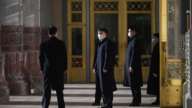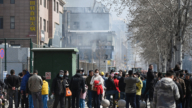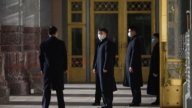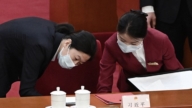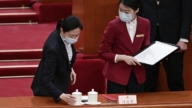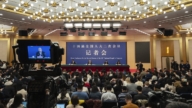【新唐人2013年03月18日訊】16號,中共全國人大通過多項人事任命,新任國務院總理李克強的人事班底終於出臺。外界分析,相比10年前胡錦濤、溫家寶處處受制於江澤民派系,習近平、李克強現在所處的人事環境要有利得多。但面對日益嚴峻的執政危機,習近平、李克強能否突破中共體制束縛和利益集團的阻礙,前景並不樂觀。
根據中共全國人大十二屆一次會議16號通過的決議,張高麗、劉延東、汪洋、馬凱被任命為新一屆國務院副總理,中央書記處書記楊晶、國防部長常萬全、原外交部長楊潔篪、公安部長郭聲琨、國資委主任王勇當選國務委員。至此,中共10年一次的權力大換屆基本完成,習近平、李克強的執政班底正式出臺。
原大陸史學教授劉因全:「我認為,比江澤民時期和江澤民影響下產生的班子要好一些。這也說明江派勢力在衰退。」
外界分析,根據排名,政治局常委張高麗將擔任常務副總理,主管金融。前國務委員劉延東主管科技、教育。汪洋主管工業及對外經貿。原國務院發改委主任馬凱則主管農業、林業等。
這其中,劉延東被認為是團派人物,受到胡錦濤、溫家寶信任,馬凱則是溫家寶的手下幹將。而團派大將、原廣東省委書記汪洋,一直被視為「改革派」的代表人物。這次汪洋成為排名第三的國務院副總理,主管國家發改委、國土資源部、住房建設部、商務部等,角色明顯吃重。汪洋還將接替王歧山,成為中美戰略經濟對話的中方代表,並負責與歐盟等進行經貿對話。
原大陸史學教授劉因全分析指出,當年,胡錦濤、溫家寶因為受到江澤民安插人馬的干擾,導致「政令不出中南海」。相比之下,胡、溫通過「裸退」,把權力完全交給習近平、李克強,因此習、李目前的執政條件要比胡、溫當初好一些。但因為江派一些人馬還在、江澤民造成的貪腐作風還很盛行、再加上政法委這一爛攤子還在運作,因此習、李執政任務艱鉅。
《德國之聲》中文網援引《南德意志報》的文章指出,大陸新總理李克強面臨的經濟挑戰相當艱鉅。而處事低調謹慎的李克強如果要改善經濟,必須先學會得罪人。
劉因全:「如果李克強不想得罪人的話,是改善不了中國的狀況的。因為中國起碼有這麼一批人需要得罪,就是既得利益集團的一些人。這些人已經形成了一個龐大的既得利益集團,他們抱成團,抵制改革。」
劉因全指出,習近平、李克強等人也意識到中共面臨的危機,並試圖解決這些問題。但他們會遇到兩大阻力,一個是官員腐敗,一個是江澤民「血債派」繼續堅持對法輪功學員和維權異議人士的迫害。因此,習、李的「改革」很難收到大的成效。
劉因全:「他們都不敢觸動這個體制,不敢觸動江澤民留下爛攤子的癥結。只是在小的方面、在籠子裡進行一些修修補補的改革、改變。」
北京時政觀察人士華頗也向《新唐人》表示,習、李和中共既得利益集團將會有一番生死鬥,但習近平不會放棄一黨專制。
北京時政觀察人士華頗:「他還要有『四個堅持』,其他方面可能會有些開放的動作,但是不要指望他會實行民主、憲政。」
《德國之聲》的報導還指出,獨攬黨、政、軍大權的習近平,將主導中國未來十年的走向。但在中共的體制結構之中,習近平的行動空間有限。
採訪/劉惠 編輯/李謙 後製/周天
CCP Leadership Team Under Li Keqiang Revealed
On March 16, the National People’s Congress
(NPC) of the Chinese Communist Party(CCP)
approved the appointment of the leadership team.
This new team is under the new Premier Li Keqiang.
Analysts say that Xi Jinping and Li Keqiang face a better
situation than Hu Jintao and Wen Jiabao 10 years ago.
However, in facing a growing ruling crisis, will Xi and Li
be able to break from the shackles of the CCP system?
Can they break the barriers
from the vested interest groups?
The outlook does not look promising.
On March 16, the NPC first session passed a resolution.
Zhang Gaoli, Liu Yandong, Wang Yang and Ma Kai
were nominated as new Vice Premiers of the CCP regime.
The new state councilors are CCP Secretariat
Yang Jing, Defense Minister Chang Wanquan,
and ex-Foreign Minister Yang Jiechi.
They are also joined by CCP top cop Guo Shengkun,
as well as Wang Yong, director of State-owned
Assets Supervision & Admin Commission.
Now the regime has basically completed
its once-in-a-decade power transition.
Liu Yinquan, former Professor of History: “I think
the new leadership team is better than the one
generated under the Jiang Zemin administration.
Also, it shows that the Jiang’s faction has waned.”
According to rankings, analysts speculated that Zhang Gaoli
may serve as Deputy Premier, placed in charge of finance.
Liu Yandong may control science, technology and education.
Wang Yang may take charge of industry and foreign trade.
Ma Kai may be in charge of agriculture and forestry.
Liu Yandong, with experience in the Communist Youth
League, has been trusted by Hu Jintao and Wen Jiabao.
Ma Kai was a go-getter under Wen Jiabao.
Wang Yang, a core member of the Youth League
and former Party chief of Guangdong, is
considered a major figure of CCP reformist forces.
Wang Yang is expected to take an important role that
leads National Development & Reform Commission,
Land & Resources Ministry, Ministry of Housing &
Urban-Rural Development and the Commerce Ministry.
Also, Wang will replace Wang Qishan as Chinese
representative in China-U.S. Strategic Economic Dialogues.
He will also take this role in the economic
dialogues with the EU, and with other nations.
Liu Yinquan remarks that in the past, Hu and
Wen were perturbed by Jiang Zemin’s fraction.
This lead to officials’ defying
central orders and prohibitions.
Now, authority has been fully transferred to Xi Jinping
and Li Keqiang, who face a better situation than Hu-Wen.
Liu points out that Jiang’s faction still
exists, as does rampant corruption.
The Political & Legislative Affairs sector is still functioning.
Therefore, both Xi and Li are facing arduous challenges.
Chinese version website of Deutsche Welle
quoted an article in the Süddeutsche Zeitung.
It said that the new Premier Li Keqiang
faces quite daunting economic challenges.
The article argued that Li, who is low-key and
prudent, must first learn how to offend people.
This is if he wants to improve the economy.
Liu Yinquan: “Li Keqiang couldn’t improve
China’s situation without upsetting people.
Groups with vested interests are
those who have to be offended.
They stick together in a huge vested
interests group, in order to resist reforms.”
Liu Yinquan says that Xi, Li and some other
top officials have realized the CCP’s crisis.
They want to crack these problems,
but encounter two major resistances.
The first is official corruption.
The second is the continuation of the persecution of
Falun Gong practitioners, religious minorities, and dissidents.
This was enacted by the blood-debt faction,
under the leadership of Jiang Zemin.
Liu expects that the Xi-Li “reform” will
hardly be able to get favorable results.
Liu Yinquan: “They both dare not touch the CCP system,
and neither dare touch the crux of the mess left by Jiang.
They’re just tinkering in some minor
aspects, and are still within the system.”
Hua Po, political observer in Beijing, comments.
Xi-Li will engage in a life and death struggle
with the CCP vested interest groups.
But Xi Jinping won’t give up the
one-party dictatorship, he says.
Hua Po: “He has advocated “Four Adherences”.
He may relax the control in some other areas, but don’t
expect him to practice democracy and constitutionalism.”
Deutsche Welle reported that Xi Jinping, top
chief of the Party, the regime and military,
will dominate China during the next decade.
However, being a member within the CCP system,
Xi Jinping’s space to act is limited, said the news report.



